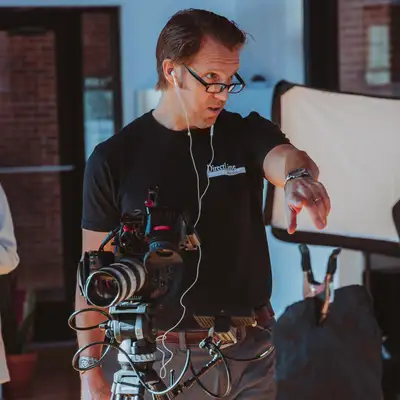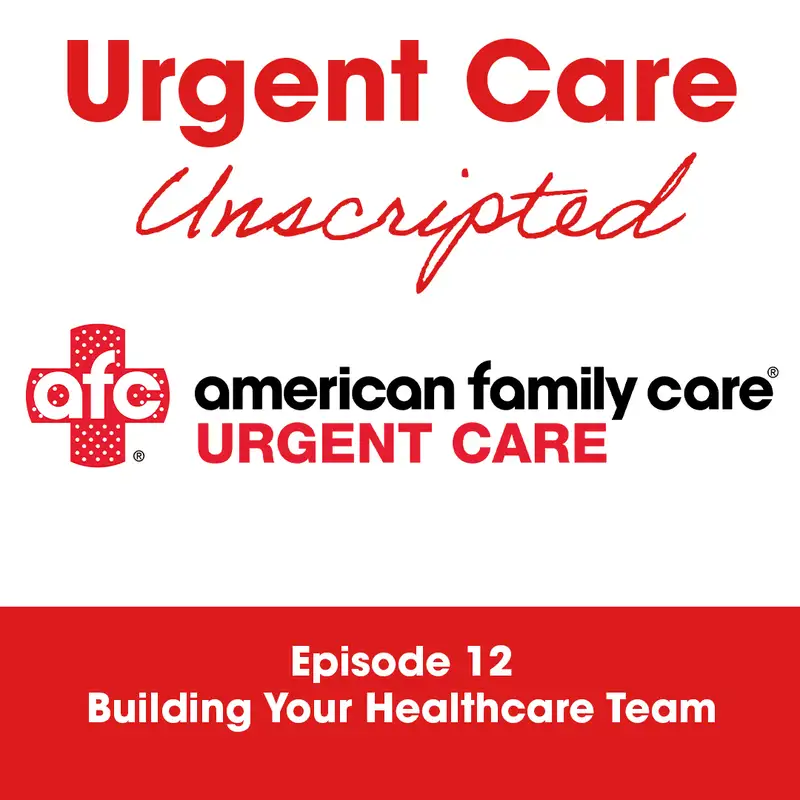Urgent Care Unscripted: Ep. 12 - Building Your Healthcare Team
Welcome back to Urgent Care Unscripted.
My name is Barbara Ronalter.
I'm the director of operations
and business
development for AFC
Urgent Care, West Haven.
And this is Mohamed Saman and in honor
of the urgent
care in the statement and in the statement
No.
we're
here to talk about an interesting topic,
building your own health care team.
Is something that you don't maybe
think about it all the time until you're
in that situation.
Who is your team
that cares and supports them?
Diagnosis and treats you at the moment?
Yeah, I think we get this question a lot.
Most people
think about their health care team.
They really just think
about their primary care provider.
But obviously, health care
team is a lot bigger than that.
And today we're going to welcome
Felix Pacheco, our medical director.
And, also a veteran er, physician
veteran makes you sound.
So he is all you are, a little old.
Me to be here.
And I really have enjoyed,
and very proud to have worked with, Doctor
Pacheco for, for, for quite a while now
because he has helped us
shape, give us shape and structure
and discipline and the outside
for how to build this clinic
and build a team here.
And so I am really fortunate
to have him here to join us.
Talk about a patient perspective.
I felt like a plastic
surgeon in that description.
I was going to say, don't let your head
get too big there, please.
So let's start with the basics.
When we say health care team,
what are we really talking about?
So if you think about every,
piece and individual
and the people who surrounded ensuring
that they're healthy.
Yeah.
But, more and more, what we're seeing is
that it's not just a place
for a quick fix or, you know, a place
where you come only when you are sick.
I mean, more and more patients want,
to stay in touch with us
to build a relationship with us
before anything unexpected, happens.
And and that and that helps them
to get going with their life faster
than they could have
if they didn't have their business.
Definitely.
And I think,
it touches on a couple of things.
Modern day needs
and timing of society jobs and being
and everything else that goes on.
You know, your individual needs
and technology has a fit and,
primary care is often
thought of as the home of the health
care home or the individual.
Right.
But then sometimes
you are away from home.
Can't get into the home.
It takes too long to get into the home,
you know, think about all those reasons
and you have to think, okay, well,
how can I satisfy
these needs that, you know, maybe, the,
the urgent
and the way you want to be seen.
So because you have an illness,
you don't feel well,
it could be the weekend, you know?
Yeah.
Or they're not open or, you know,
it's, you know, it's,
they don't have space
because other people are sick as well,
you know, think about, like, flu season
now everyone's sick and, primary care
providers will be busy then.
I mean, everyone's busy then, but,
you want to have a team
because of the needs
that need to be addressed can vary.
And if you can't be seen by your primary
care doctor, then you have some of those.
Yeah, absolutely.
I think from an operational standpoint,
I can definitely see a clear difference
when patients come to us and connect,
not not only come to see us
like on a regular basis, not going,
not jumping from place to place,
but also connects us
with their primary care providers
and their cardiologists and whatever
other specialties they might be seeking,
because we are able to build
a better assessment for the patient,
knowing all that information
and also communicate
with the partners that we have.
I would I would consider primary care
providers, our partners,
same thing with specialists.
So I think it's very important
that you have a home
and have a home in primary, but
also have a home in urgent care as well.
Yeah. And it's not like,
we are replacing.
No. Yeah.
At the same time,
we come with the X-ray machine,
we come with the GMC,
we come with all kinds of tests
that we can initiate, and then,
that you might not find so easily
accessible somewhere else
unless you go to an emergency.
But at the same time,
we are really doctor visits and, PCP,
we're actually partnering with,
with your GP to share
the information, to send information
to them or get the information from them
to give you the best treatment
you need at the moment
when they might not be as much accessible
or may not be as much,
you know, equipped to handle
that particular.
Yeah, definitely.
And,
I think Barbara touched on that point,
the establishment
of the relationship, you know, to
some degree, like an emergency department.
Yeah.
Unlikely to have any relationship
when you provide
a, but in the urgent care setting,
you know,
we're probably going to be close
to where you live, you know, we'll work.
And, something that we can see
your doctor, that you may have
just a few providers
that you have become accustomed to,
and they get to know you
and that changes things.
It changes
the dynamics as well. Absolutely.
And then I think one other thing
that we see a lot
is patients don't come to us and
they don't have a primary care provider.
So that relationship goes both ways
where we create a relationship
with the patient.
And we can also then guide them
towards a primary care provider
that we believe
would be the best fit for them
if they haven't been able
to find that on their own yet.
And this has eventually,
there are many situations
where of the 10,000
plus that we have seen in the last
just one year,
many of them are from patients
that are coming to us five times, ten
times, 20 times in just one year,
because they have built that relationship.
Trust us.
They have come to like the providers and
sometimes they ask for the same provider.
But can I come
and see that particular provider?
That's so refreshing
and comforting to know
that they are condition intensive
and getting the care they need.
And, trying to definitely,
I don't have much to add to that.
No, I think, that that's that's great.
It's a great example there too.
And then there's also been situations
where we've caught things
like for the first time, right.
Patients come to us regularly
and we end up saying,
hey, this is a third night,
third time you're being you've been here.
And I notice that your blood pressure
is consistently high.
So we might need to kind of address
that at at some point.
So those are things
I think even from like a pressed
by a provider perspective,
you can kind of see that trend.
And that's easier.
It makes it easier for you
to identify those conditions.
So yeah, they did.
They're definitely like,
I can definitely think of young males
not having a primary care doctor.
Right.
Because who thinks they're going
to get hurt or safe
when they're like 20 something years old,
and then one day they're 50
something or 60 something and the doctor,
and then you have these visits
where you haven't checked in with anyone.
And, you know, things get noticed,
you know,
I mean, ideally you'd have a health care
home, but,
you know, we can definitely try
to pick things up and hopefully
prevent them before
it becomes something truly problematic.
Thinking about having a healthcare team,
what would be the steps towards that?
What can I do?
Okay, if I do this, this, this, this,
this, then I have a health care team.
Perhaps the first step is to have a PCP,
really designed for yourself.
And then what?
And then I would say find an urgent care,
because that's probably going to be
your second, your second home.
I would say.
And if you're a woman,
you should probably get it.
Oh, by and of course, yes.
But in general,
it depends on what your individual needs
are, your age, your risk factors.
But having a primary care,
home as well as or you care,
you could consider a second home
or an apartment.
There you go.
Your city apartment?
Yeah.
So have, PCP identified?
Have a no. Did you?
I and I didn't decide if you have kids,
but I also,
have a long term
basis pediatrician to have that done.
And then.
And then,
come to us for any urgent care
needs or even advice and consult the
you can treat it.
Or can we then send you back to the city,
or for nutrition or maybe an,
urgency room situation,
but having that relationship established
with these entities will keep
you covered from the other can respect.
Yeah.
You know, sometimes,
we don't speak about the, mental
health needs as well, but,
you know, there's therapies
that are probably needed.
Some providers and patients, like,
definitely for providers.
I don't.
All right,
so next time you need an urgent care
or you need an urgent care home,
definitely look for something that's
conveniently located to
you and has good hours.
Obviously, we are always available for
our saving community or surrounding areas.
We are at 354 Sawmill Road in West Haven.
And thank you so much for listening today.
And thank you for listening to us.
So your health care team
that we covered the topic today
does not have to be complicated,
but as long as they're connected
and as long as you have,
definition around it
and those relationships, you are way to go
and take good care of your
and your family is done.
We appreciate everybody
joining and listening.
And thanks, Barbara and Felix, for your,
advice and kind words and
looking forward to the next episode
right here with you.
Yeah. Thank you.
Creators and Guests




